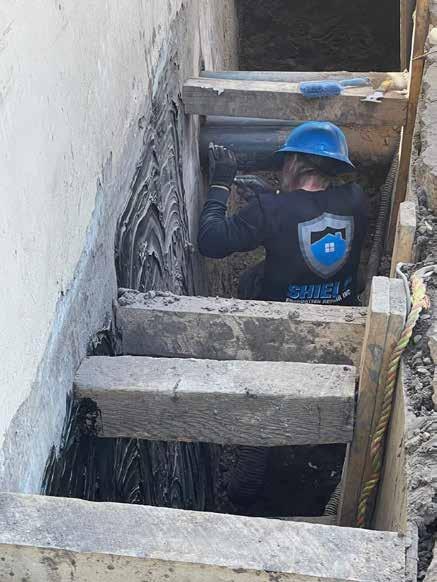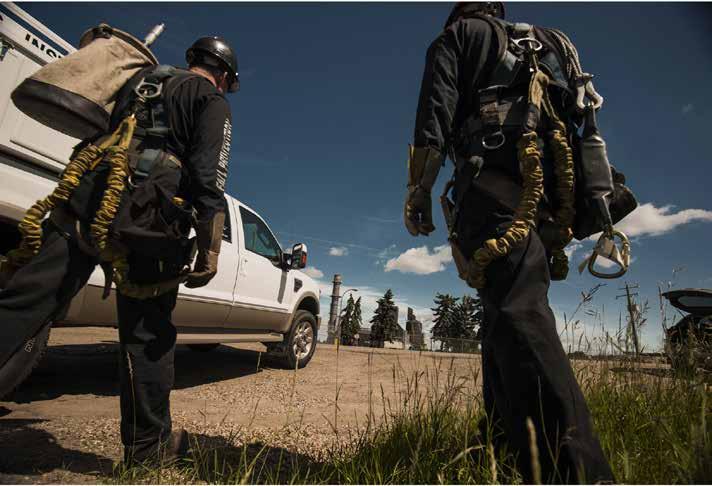
5 minute read
LEADING BY EXAMPLE
Emerging Leadership Institute builds the skills of next-generation construction leaders
By Daniela Cohen
Advertisement
The Emerging Leadership Institute (ELI) is designed to provide handson leadership skills training to up and coming leaders in the construction industry. The program is delivered by the Edmonton Construction Association (ECA) in partnership with the FMI Corporation.
Specializing in leadership training for construction professionals in North America, FMI has successfully implemented this program for over 25 years. The three-day intensive program is held in person once a year, the most recent ran from April 18 to 20, 2023 with 23 participants.
“We often use the term ‘nextgeneration leader’. Guys like me need to retire and we need a whole new generation of young leaders who can step up and do their thing their own way and take the industry to where it needs to go,” said Ed Palpant, a principal at FMI and one of the course facilitators.
As someone who has owned three businesses, including in the construction industry, Palpant brings extensive experience to the program. During the banking and housing crisis in 2008 and 2009, he said many mid-career leaders left the construction industry, so younger leaders are now being “thrown into significant leadership roles that [they previously] may not have had to worry about quite as quickly”. The ELI helps to build a strong foundation for these leaders by focusing on three main aspects: how you lead yourself, how you lead others, and how you lead the work.
Over the past 70 years, A. Clark Roofing & Siding has helped hundreds of thousands of homeowners and businesses in Edmonton and Calgary with our attention to detail and foundational approach to the field of roofing and siding. We understand what it takes to provide a roof that can withstand our specific climate. We have been there every step of the way. By utilizing the highest standards of safety and quality we out-do our competition on your project’s longevity and reliability. But most of all, we attribute our years of success to providing great customer service.



Leading yourself and others effectively involves having a good understanding of people’s different personalities.
“Everyone knows that intellectually, but how do we learn to appreciate it and respect it so that we build better teams?” said Palpant. “When you start by understanding how you think, and then that alongside how other people think, and when you can pair those two, now you can lead differently. Instead of always doing what works for you as the leader, how do you do what works for the people that you’re leading?”
Communication and delegation are other important aspects of effective leadership. And in terms of the work itself, Palpant said the focus is on problem solving. He adds that in this particular course, they focus on what are the biggest problems in the construction industry, and what could a set of new generation leaders do to make that better.
Luke Toller, project manager at IMARK Architectural Metals, participated in the April ELI and found it more introspective than he expected. He said he most enjoyed learning “how to give people information in a way that makes more sense to them” to make sure both parties involved have the same level of understanding of what’s being discussed. He also appreciated learning how different people display stress and how to be able to help them, as well as awareness of his own communication style when under stress.



In addition, he saw how the learning in the program could be applied to communication with his two young kids, who may need a different delivery of the message for it to resonate.
He is confident these skills will serve him well in the future.
“The idea of the entire process that we’re working through is how do we make our work atmosphere more fluid, more streamlined, more productive? So, taking the time to understand everybody within your team, I think is the most valuable thing that I got out of this. Knowing now that I have this basis of skills where I can assess people in my team, and I can assess myself while we’re working together, and see the way forward for all of us, knowing that we’re having a productive and also a healthy work environment,” said Toller. “And that creating an atmosphere for all people be] healthier and happier and feeling more comfortable in our roles, inevitably we’re going to be more successful as a group.”
Jeff Juravinski, project manager


at Delnor Construction Ltd., also participated in the April ELI. He particularly enjoyed the interactive nature of the course and the opportunity to hear other participants’ perspectives. For Juravinski, it was nice to get into a room with people in similar positions as himself, but from other companies. He enjoyed how he was able to share his struggles and realize that he had more in common with others even though his classmates were competitors.
He said he learned that listening is a skill he needs to work on. “I think one of the big emphases was, you’re listening to understand, not to respond,” said Juranvinski. “And there was a certain portion where we went through a bit of an exercise, and it highlighted to me that that’s a big area I need to work on.”
Increased self awareness is an important part of the impact Palpant has seen through facilitating the program.
“One particular person thought it was an effective leadership style to ram his idea and his agenda down everybody’s throats, thinking, ‘I’m a smart guy, and I know what the right answer is’,” said Palpant. “But he became hyper aware that ‘Wow, not everybody thinks like me. If I’m going to get the best from them, I can’t just expect them to be like me. I need to get the best from them in who they are….’ If you think as a more highdominant person, that’s a big revelation and several other people said, ‘Wow, I can’t believe that you are willing to admit that’.”
Effective time management is another benefit of the program, said Palpant. He adds that participants often share that they’ve got to make some tough decisions about where they give their time.

“And where I say no, because now as a leader, I have to say no to more and more things. And we also tie that to their personal life because no leader is a leader only at work, right? And so sometimes you have to think, ‘Okay, are my kids getting enough time? Is my significant other getting enough time? Am I taking care of my own health?’ Things like that. Because if you’re not doing that, it’s hard to be a really good leader for other people,” he says.
Juravinski said the program is going to help him navigate challenging situations while working with a diverse range of stakeholders with different perspectives and values to accomplish common goals. And in addition to being applicable in his work in the construction industry, he feels he can use the learning from the program in his personal and family life.
“It’s not just one dimensional,” said Juravinski. “It’s good for every facet of my life.” u





The Infrastructure Owners Forum was launched in 2017 to help those in the Owner community to better collaborate, build understanding and connect, with the purpose of improved integration across the construction continuum, and quality outcomes for the entire construction sector.
The group meets bi-annually and now includes over 20 public owners and several developers meeting with industry to tackle common challenges.














